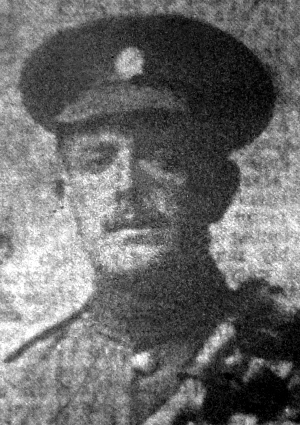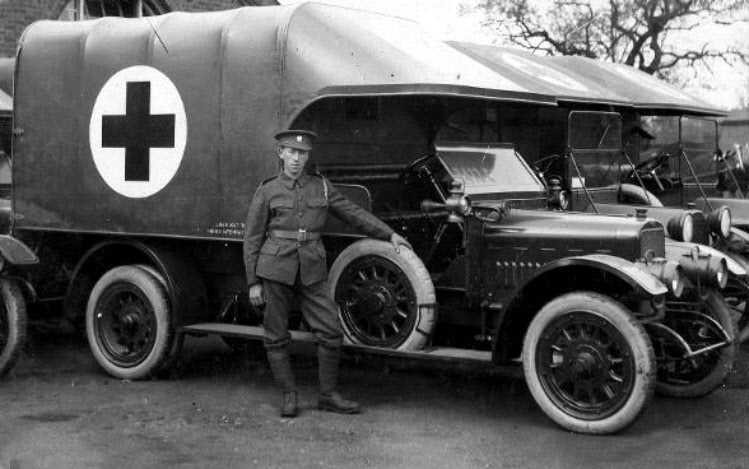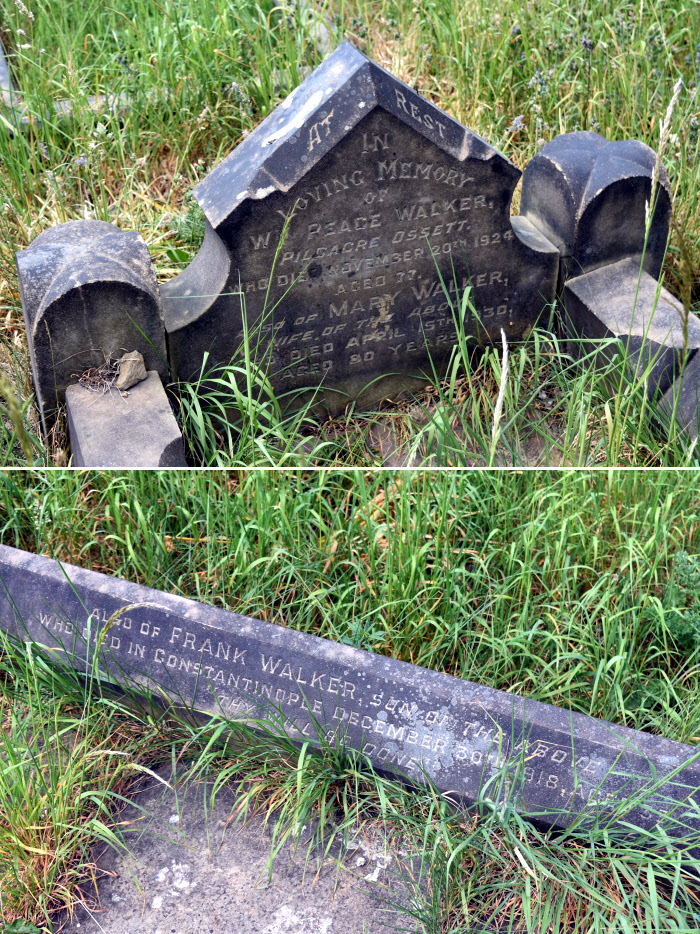
Frank Walker was born in Thornhill on the 16th July 1885 and baptised at Thornhill Lees, Holy Innocents’ Church on the 21st August 1885, the son of blacksmith William Peace Walker and his wife Mary (nee Gledhill). The couple, both born in Thornhill, married at Dewsbury All Saints Church on the 7th October 1871.
By 1891 William and Mary and eight children, six boys and two girls, aged between 3 and 19 years old, had moved to Ossett and were living on Wesley Street, where William worked as a blacksmith.
In 1901 William Walker is a colliery blacksmith at nearby Pildacre Pit Yard and the family, including six of the children, remain living on Wesley Street. Frank, aged 15, has found work as a butcher’s apprentice.
In 1911 Frank and his youngest sister are the only children living at their Pildacre Hill home with their parents. Frank is now a carter for a general carrier and his father is still working as a colliery blacksmith.
Frank Walker’s army service record has survived. At the age of 30 years and 4 months, Frank Walker, 5’ 2½ ” tall, weighing 135 lbs, single, and a warehouseman, voluntarily enlisted on the 30th November 1915. He joined the Army Service Corps with service number T4/143205 and was posted to Reserve until the 29th February 1916. By the 10th March 1916, he was training at Blackheath with 2 H.T.D. and on the 26th September 1916 he embarked on the H.T Megantic at Devonport arriving in Salonica on the 5th October 1916, joining 3 B.H.T.D on the same day.
On the 17th February 1917, Private Walker was confined in hospital for several days suffering from scabies and on the 16th July 1918, he was charged “that when on active service he was guilty of conduct prejudicial to good order and military discipline.” Frank had made a false statement to an NCO in attempting to obtain more than his allotment of beer at the Canteen. He received 14 days F.P. No 2. Unlike F.P.1, in Field Punishment Number Two, the prisoner was placed in fetters and handcuffs but was not attached to a fixed object and was still able to march with his unit. This was a relatively tolerable punishment but the man also lost pay, fell down the leave roster, was fed on bully beef and biscuits, received no cigarettes or rum and was kept hard at work on manual labour or unpleasant sanitary duties.
Frank Walker was admitted to the 27th Casualty Clearing Station (CCS) in Constantinople on the 25th December 1918 with a high temperature, back and limb pains plus a sore throat and cough. He died five days later, at 10.30 p.m. on 30th December 1918 from pneumonia and influenza. A note elsewhere on his record identifies that he has been vaccinated several times but the vaccinations did not take.
Frank’s death was notified by telegram to the Attest Commissariat, Woolwich Dockyard on the 4th January 1919, suggesting that his parents would have been informed shortly thereafter. His mother was awarded a separation allowance and allotment of pay of 12/6d, payable to the 13th July 1919.
On the 15th April 1919, the War Office give instruction that any effects of Private Frank Walker, 82nd Field Ambulance, Royal Army Service Corps, were to be returned to Mr. William P. Walker, Pildacre Hill, Ossett. In December 1919, the Memorial Roll and the King’s letter was acknowledged by Frank’s parents in the following terms: “Sir, we beg to thank His Majesty for his kindly regards of our Dear Son Frank. We remain his Affectionate father & mother Wm Peace and Mary Walker.”
At this time William and Mary were also required to return, as was the norm, the names and addresses of Frank’s siblings of which there were many. His brothers were George Peace Walker (47), of High Street, Kippax; Arthur Walker (45), of Station Road, Ossett; Joseph Henry (43), of Bath Road, Wolverhampton; Sam Walker (40), of Hoyle Mill Barnsley and Percy Walker (36), of Swinton. His sisters were Maria Townend (38), of Runtlings Lane, Ossett and Ann Fawcett (32), of Pildacre Hill, Ossett.
Whilst a young man living and working on Wesley Street, Pildacre Hill, Ossett, Frank lived two doors away from the Asquith family, including John William Asquith (born 1891), who was killed in action on 12th May 1917.
Even closer to home, tragedy was to hit the family again. Frank’s sister, Maria, was married in 1906 to John Henry Townend, who was the brother of Archer Townend, killed in action on 10th April 1917.
Private Frank Walker’s Medal Card records his award of the British and Victory medals and his rank of Driver.
The unsung heroes of the British army in the Great War, the Army Service Corps (A.S.C) were nicknamed “Ally Sloper’s Cavalry” by a WW1 music hall star, after a fictional comic-strip character. Because of their good pay, comfortable conditions and comparative safety, frontline troops didn’t regard them as proper soldiers. However, soldiers cannot fight without food, equipment and ammunition. In the Great War, the vast majority of this tonnage, supplying a vast army on many fronts, was supplied from Britain. Using horsed and motor vehicles, railways and waterways, the A.S.C. performed prodigious feats of logistics and were one of the great strengths of organisation by which the war was won.
At the time of his death, Frank Walker was attached to the 82nd Field Ambulance, Royal Army Medical Corps and was working as an ambulance driver. The 82nd (2nd Home Counties) Field Ambulance, Royal Army Medical Corps served with 27th Division.
In mid-1918 a number of units returned to France and in September the remaining units of the 27th Division were in action in the final offensive in Salonika, including the capture of the Roche Noir Salient, the passage of the Vardar river and the pursuit to the Strumica valley. Hostilities with Bulgaria ceased on the 30th of September, the 27th Division continued to advance and war was ordered to halt and turn about on the 2nd of November, being ordered to the Black Sea. The Division reached Constantinople on the 19th of December and set up a HQ at Tiflis in January 1919. The Division was finally disbanded on the 24th of September 1919 at Batum.
The Field Ambulance was a mobile front line medical unit (it was not a vehicle). Most came under command of a Division, and had special responsibility for the care of casualties of one of the Brigades in the Division. Each Division had three Field Ambulances. The Field Ambulance was divided into three Sections. In turn, those Sections had Stretcher Bearer and Tented subsections. The Field Ambulance was composed of 10 officers and 224 men.
As with all other units, the Field Ambulances relied heavily on horses for transport, and had an establishment of 14 riding and 52 draught and pack horses. They worked the 23 wagons, 3 water carts, 3 forage carts, 6 GS wagons, 10 ambulance wagons and the cooks wagon. The Ambulance also had a single bicycle. RAMC officers and men did not carry weapons or ammunition. By the end of 1914, each Field Ambulance also included 7 motor ambulance vehicles. A workshop to maintain them was added to the Division, although in 1916 it was absorbed in the Supply Column.
The “Ossett Observer” 1 had this short obituary for Frank Walker:
“Ossett Soldier’s Death At Constantinople – News has come to hand that Driver Frank Walker (33), Army Service Corps, the youngest son of Mr. William Peace Walker, of Pildacre, Ossett, died at Constantinople on December 31st last from influenza and pneumonia. Deceased, who was unmarried, had served in the army for nearly three years and previously worked as Messrs. Fitton and Sons, Pildacre Mills. A brother is still serving.”

Above: A motorised WW1 R.A.M.C ambulance possibly like the one Frank Walker drove for the 82nd Field Ambulance when he was based in Constantinople, Turkey.

Above: The Walker grave at St. John’s Methodist Chapel showing the memorial to Frank Walker, sons of William Peace Walker. Picture courtesy of Lisa Jennings.
Private Frank Walker died on the 31st December 1918 at the age of 33 years, another victim of the Spanish flu pandemic that swept through Europe in 1918 and 1919. He was buried at the Batoum British Cemetery, but is now remembered on Screen Wall Panel 7 at the Haidar Pashar Memorial, 2 Istanbul, Turkey. Haidar Pasha is a suburb of Istanbul between Scutari (Uskudar) and Kadikoy on the Asiatic side of the Bosphoros. The cemetery is on high ground behind the Haidar Pasha pier head and railway station.
The Haidar Pasha Memorial stands within the war graves plot of Haidar Pasha Cemetery and commemorates more than 30 Commonwealth servicemen of the First World War who died fighting in South Russia, Georgia and Azerbaijan, and in post Armistice operations in Russia and Transcaucasia, whose graves are not known.
An Addenda panel was later added to commemorate over 170 Commonwealth casualties who are buried in cemeteries in South Russia and Transcaucasia whose graves can longer be maintained, including Batoum British Cemetery where Private Walker was interred.
References:
1. “Ossett Observer”, 12th January 1919